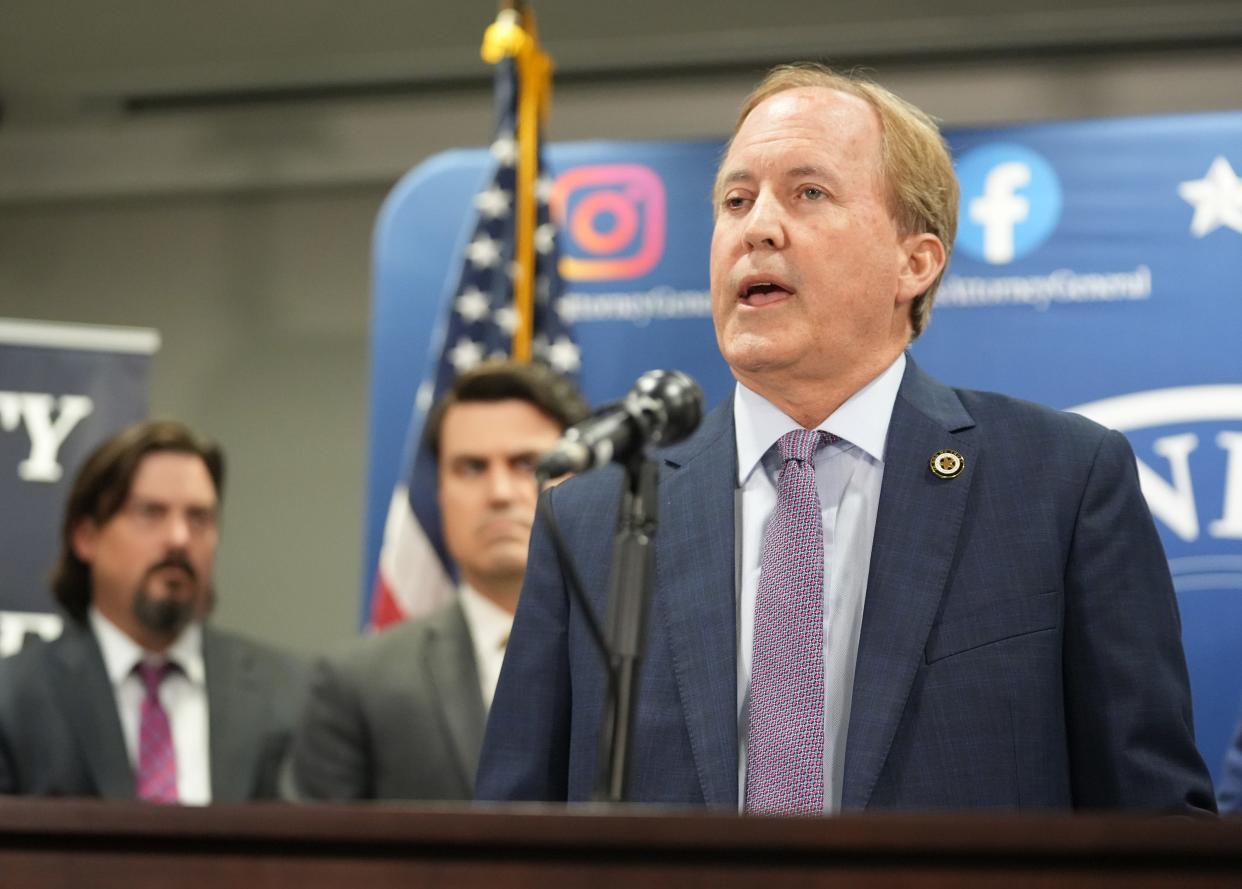AG Ken Paxton pushes false narrative in lawsuit over Pfizer's COVID-19 vaccine | Grumet

- Oops!Something went wrong.Please try again later.
Texas Attorney General Ken Paxton could’ve saved himself a lot of trouble by checking the state’s own numbers before he sued Pfizer.
The Texas Department of State Health Services even put the figures into easy-to read charts: A soaring gray line depicting the higher rate of COVID-19-related deaths among unvaccinated Texans over the past two years, hovering well above the blue and orange lines for deaths among those who got vaccines and boosters.
Unvaccinated Texans were “11x more likely to die of a COVID-19 associated illness” than fully vaccinated Texans, a bright green box tells visitors to the state-run COVID-19 Deaths dashboard.
But the COVID-19 dashboard doesn’t make headlines. Paxton does. And his latest crusade, a lawsuit accusing Pfizer of misrepresenting the effectiveness of its COVID-19 vaccine, spins an anti-vax tale at odds with state data and Texans’ experience.
Stacks and stacks of studies have demonstrated that COVID-19 vaccines were effective at reducing the chances of serious illness or death from the virus. Yet there was Paxton on Friday telling conservative radio host Chris Salcedo that Pfizer’s vaccine “may have been, and it looks like it was, not effective at all.” Worse, his lawsuit claims some areas saw higher rates of death among vaccinated people than unvaccinated ones.
Paxton’s office did not respond to my inquiries Friday.
Paxton’s lawsuit — which Pfizer flatly says “has no merit” — recycles misleading arguments that fact-checkers have roundly debunked. Lest there be any doubt this is a political stunt on behalf of an anti-vax base, Paxton did not file the case in Austin, where his office is headquartered; or Dallas, where Pfizer’s Texas agent is located. He filed in Lubbock, where the case is assured to reach a conservative judge.
While politically charged lawsuits are Paxton’s norm, this case is a vehicle for pushing a false narrative that undermines public health.
“The rhetoric behind this lawsuit does nothing to make us safer,” Terri Burke, executive director of the Houston-based Immunization Partnership, told me via email. “In fact, by casting doubts on a vaccine manufacturer’s credibility, it serves to further erode confidence in all vaccines.”
Paxton’s lawsuit also exhibits curiously selective memory. He castigates Pfizer for the fact that its vaccine didn’t swiftly end the pandemic. But he ignores other factors that surely prolonged it, such as Gov. Greg Abbott’s decision to end mask mandates and lift all occupancy restrictions on businesses in March 2021, when less than 13% of Texans had received any shots, and only 6% were fully vaccinated.
Paxton’s lawsuit also blasts Pfizer for “misleadingly casting itself and its vaccine as the champions of ‘science’ that would bring about an end of the pandemic and return America to normal.” Notably absent from the lawsuit: Similar comments by then-President Donald Trump, a Paxton pal who touted the COVID-19 vaccines as "amazing" and "a miracle."
“This will quickly and dramatically reduce deaths and hospitalizations,” Trump said at a December 2020 event announcing the plans to roll out the first COVID-19 vaccines, with Abbott and other governors in attendance at the White House. “And within a short period of time, I think we want to get back to normal.”
I recognize some people did not want to take a new vaccine, or any vaccine at all. That choice belongs to each person. (Ultimately, nearly two-thirds of Texans became fully vaccinated.)
The big lie of the pandemic was the suggestion the coronavirus wasn’t all that bad, that no safety measures — masks, distancing efforts or optional vaccines — were needed against a virus that killed 1.1 million Americans.
Otherwise healthy people expired on ventilators. Overwhelmed morgues needed refrigerated trucks to hold the bodies. Downplaying the danger of COVID-19 was wishful thinking of the deadliest kind.
Instead of leaving that difficult chapter in the past, Paxton’s lawsuit reopens it and attempts to rewrite it. Paxton seeks more than $10 million in civil penalties against Pfizer, plus a judge’s ruling that the pharmaceutical giant cannot keep touting the effectiveness of its vaccine.
But really Paxton seeks the court’s imprimatur on an alternative reality, one where real medical breakthroughs that protected millions of lives are somehow fake, and dangerous misinformation is somehow true. Let’s hope the facts prevail.
Grumet is the Statesman’s Metro columnist. Her column, ATX in Context, contains her opinions. Share yours via email at bgrumet@statesman.com or via Twitter at @bgrumet. Find her previous work at statesman.com/news/columns.
This article originally appeared on Austin American-Statesman: Texas AG Paxton's lawsuit against Pfizer pushes false COVID narrative

